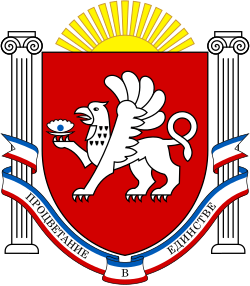This article has multiple issues. Please help improve it or discuss these issues on the talk page . (Learn how and when to remove these messages)
|
Verkhovna Rada of Crimea
| |
|---|---|
 | |
| Type | |
| Type | |
| History | |
| Founded | 19 June 1991 |
| Disbanded | 15 March 2014 |
| Preceded by | Crimean Regional Council |
| Succeeded by | State Council of Crimea |
| Leadership | |
Vladimir Konstantinov (last) | |
| Structure | |
| Seats | 100 |
 | |
Political groups | Government (80)
Opposition (20)
|
| Elections | |
| Mixed-member proportional representation | |
First election | 27 March 1994 |
Last election | 31 October 2010 |
| Meeting place | |
 | |
| Building of the Supreme Council of Crimea, Simferopol | |
| Website | |
| rada | |
| Constitution | |
| Constitution of the Autonomous Republic of Crimea | |
Verkhovna Rada of Crimea or the Supreme Council of Crimea, officially the Supreme Council of the Autonomous Republic of Crimea, [a] was the Ukrainian legislative body for the Autonomous Republic of Crimea before the annexation of Crimea by Russia in 2014.
Contents
The last election of parliament took place on 31 October 2010 (see 2010 Crimean parliamentary election) and was won by the Party of Regions and the Communist Party of Ukraine.
On 27 February 2014, unidentified armed men took over the parliament and hoisted the flag of Russia over it. On 15 March 2014 the Verkhovna Rada of Ukraine officially dissolved the parliament. [1] On 17 March 2014, one day before the Russian annexation of Crimea, [2] the State Council of Crimea was established in place of the Verkhovna Rada of Crimea.
